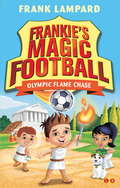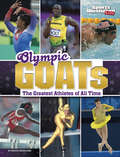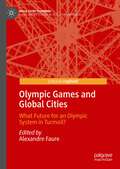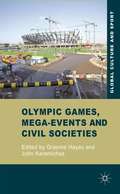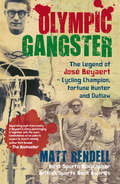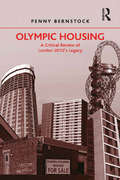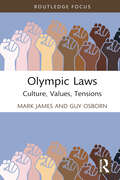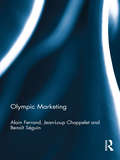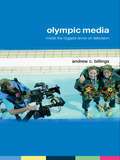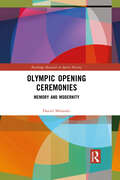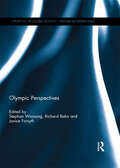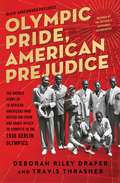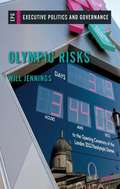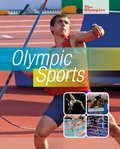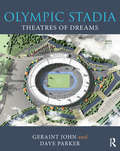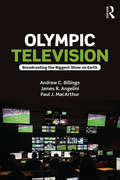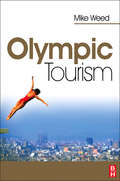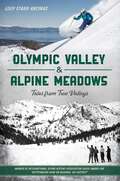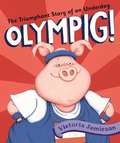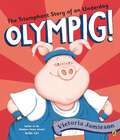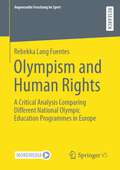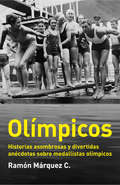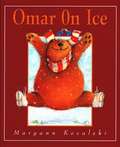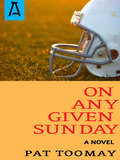- Table View
- List View
Olympic Flame Chase: Book 16 (Frankie's Magic Football #16)
by Frank LampardA fantastic series for 5+ readers combining magic and football, by superstar footballer Frank Lampard.Frankie and his team love playing football. There's always time for a game.Frankie and his friends are at their school sports day when the magic football sends them back through time, to the original Olympic Games in ancient Greece! The team join in, but the mischievous god Hermes is causing chaos...and when they accidentally bring Hermes back with them, their own sports day might be ruined too.How will Frankie stop Hermes before the Games are ruined for ever?Perfect for sports fans everywhere in the run-up to the Olympic Games!
Olympic GOATs: The Greatest Athletes of All Time (Sports Illustrated Kids: GOATs)
by Bruce BerglundHow do you pick Olympic GOATs? Is it gymnast Simone Biles or swimmer Michael Phelps? Or maybe it’s the entire 1992 basketball team. With so many sports, how do you choose? It comes down to stats, history, and hunches. Read more about some of the legends of the Olympic Games and see if you agree that they’re the greatest of all time.
Olympic Games and Global Cities: What Future for an Olympic System in Turmoil? (Mega Event Planning)
by Alexandre FaureThis book offers a comprehensive overview of current debates on the influence of the Olympic Games on cities, urban policies and the governance of global cities, making a valuable contribution to the fields of Olympic studies and urban studies. Historically, Western cities such as Paris, London, and later Los Angeles, have been the primary hosts of the summer Games. However, the link that existed between the world metropolises of the last century and the Games has deeply changed. Growing concerns about the Games' costs and environmental impact have prompted a shift in the expectations of candidate cities and the International Olympic Committee (IOC). This evolution favours more modest bids, and a resurgence of global cities and historical Olympic host cities within the Olympic landscape. This book is an essential resource for researchers in Olympic studies, urban studies, and all those involved in the planning of these events.
Olympic Games, Mega-Events and Civil Societies
by Graeme Hayes John KaramichasThis volume explores sporting mega-events, their social, political, and cultural characters, the value systems that they inscribe and draw on, the claims they make on us and the claims the organisers make for them, the spatial and ethical relationships they create, and the responses of civil societies to them.
Olympic Gangster: The Legend of José Beyaert - Cycling Champion, Fortune Hunter and Outlaw
by Matt RendellRestlessly vital and possessed of great physical strength, José Beyaert lived many lives. During the Second World War, he boxed and trafficked arms for the Resistance on his bicycle. After it, he became an international cyclist. In 1948, a mile from the end of the Olympic road race around Windsor Park, he broke away alone to take the gold medal and started an adventure that would last the rest of his life. A Tour de France rider in the sport's golden age, José was invited to open a new velodrome in Colombia, South America. He travelled, intending to stay a month. Instead, driven by his thirst for adventure, he stayed for fifty years, becoming by turns athlete, coach, businessman, emerald-trader, logger, smuggler, perhaps even hired killer. Matt Rendell, who knew José Beyaert and met many of his family, friends and associates, tells the fascinating story of an almost-forgotten sporting hero who, incapable of living by other people's rules, lived his many lives on his own terms.
Olympic Housing: A Critical Review of London 2012's Legacy
by Penny BernstockOne of the distinguishing characteristics of London's bid to host the games was its commitment to legacy where it was argued that ’the legacy would lead to the regeneration of an entire community for the direct benefit of everyone who lives there’. This book adopts a critical approach to the concept of 'legacy' focussing specifically on housing. It argues there will be a range of both intended and unintended legacy outcomes and an urgent need for revised strategies if those original objectives are to be achieved. The concept of legacy is explored in a number of ways, including an overview of housing legacy in other host cities; the experiences and perspectives of those residents decanted to make way for the Olympic Park; a critical review of legacy plans; a detailed analysis of the conversion of the Athletes’ Village into housing; and a case study of the emerging area ’Stratford High Street’, which explores issues of social class change and the limitation of planning policies. Whilst taking housing as its focus, this book adopts a sociological perspective by exploring the likelihood of social class change in order to draw conclusions about 'gentrification', 'social polarisation' and the extent to which 'social inclusion' is reflected in housing legacies.
Olympic Laws: Culture, Values, Tensions (Routledge Focus on Sport, Culture and Society)
by Mark James Guy OsbornOlympic Laws: Culture, Values, Tensions is the first book to analyse fully the Olympic legal framework and its application to the IOC and the Olympic Games through a socio-legal lens. It opens up a new window into understanding the Olympic Games across recent iterations of the Games and on to future Games. The book begins by defining the parameters of the emergent legal sub-fields of Sports Law, lex Olympica and Olympic Law, through the identification of the sources of these Olympic Laws and their underpinning norms. It then uses a series of case studies to demonstrate how lex Olympica has evolved as a means of defending the Olympic Movement from unwanted legal interventions, how Olympic Law has been created to protect the commercial rights vested in the Games, and how the legacies created by this unique category of law have a lasting impact on host cities and beyond. It concludes with a call that the IOC should recalibrate its relationships with prospective hosts and the participating athletes by requiring specific adherence to the Fundamental Principles of Olympism. This is essential reading for any student or researcher with an interest in Olympic studies, sports law, or socio-legal studies or any practising lawyer or events professional looking to better understand the impact and institutions of mega-events.
Olympic Marketing
by Jean-Loup Chappelet Alain Ferrand Benoit SeguinThe Olympic Games have become the definitive sports event, with an unparalleled global reach and a remarkably diverse constituency of stakeholders, from the IOC and International Federations to athletes, sponsors and fans. It has been estimated, for example, that 3.6 billion people (about half of the world population) watched at least one minute of the Beijing Games in 2008 on television. The driving force behind the rise of the modern Olympics has been the Olympic marketing programme, which has acted as a catalyst for cooperation between stakeholders and driven the promotion, financial security and stability of the Olympic movement. This book is the first to explain the principles of Olympic marketing and to demonstrate how they can be applied successfully in all other areas of sports marketing and management. The book outlines a strategic and operational framework based on three types of co-productive relationships (market, network and informal) and explains how this framework can guide professional marketing practice. Containing case studies, summaries, insight boxes and examples of best practice in every chapter, this book is important reading for all students and practitioners working in sports marketing, sports management or Olympic studies.
Olympic Media: Inside the Biggest Show on Television (Routledge Critical Studies in Sport)
by Andrew C BillingsLocated in the United States, NBC (National Broadcasting Company) is the biggest and most powerful Olympic network in the world, having won the rights to televise both the Summer and the Winter Olympic Games. By way of attracting more viewers of both sexes and all ages and ethnicities than any other sporting event, and through the production of breathtaking spectacles and absorbing stories, NBC’s Olympic telecasts have huge power and potential to shape viewer perceptions. Billings’s unique text examines the production, content, and potential effects of NBC’s Olympic telecasts. Interviews with key NBC Olympic producers and sportscasters (including NBC Universal Sports and Olympics President Dick Ebersol and primetime anchor Bob Costas) outline the inner workings of the NBC Olympic machine; content analyses from ten years of Olympic telecasts (1996-2006) examine the portrayal of nationality, gender, and ethnicity within NBC’s telecast; and survey analyses interrogate the extent to which NBC’s storytelling process affects viewer beliefs about identity issues. This mixed-method approach offers valuable insights into what Billings portrays as "the biggest show on television".
Olympic Opening Ceremonies: Memory and Modernity (Routledge Research in Sports History)
by Daniel MalanskiThis is the first book to unpack the history and significance of the opening ceremony of the Olympic Games, the frontispiece of the most watched event on Earth. Covering the period from the Moscow Olympics in 1980 to Tokyo 2020, the book examines when, how and why the Olympic opening ceremonies’ artistic programme became the multi-act spectacles seen today. It argues that the embedded nationalistic, ethnic and environmental discourses contained in opening ceremonies have much to tell us about national narratives, memory and myth-making, about the history of representation, and about how the Olympics and the spectacle of mega-events are prisms through which local and global socio-political issues are refracted, from the climate crisis and the struggle for minority rights to the emergence of a multi-polar world. This book is fascinating reading for anybody with an interest in the sociology, culture, history or politics of sport and events, geopolitics or performance studies.
Olympic Perspectives (Sport in the Global Society - Historical Perspectives)
by Stephan Wassong, Richard Baka and Janice ForsythHistorical research on the Olympic Movement is highly valuable as it displays processes of continuity and transformation by which knowledge building processes on the Olympic Movement, its structure and on Olympic sport can be expanded. The Olympic Movement can be addressed from multidisciplinary perspectives, including management, sociology, education, philosophy and history. This comprehensive collection examines the multifaceted profile of the Olympic and Paralympic Movement and presents new insights drawn from a variety of research projects. Historical and political dimensions of the Olympic and Paralympic Movement are addressed, along with educational, ethical, commercial and sociological perspectives.This book was originally published as a special issue of The International Journal of the History of Sport.
Olympic Pride, American Prejudice: The Untold Story of 18 African Americans Who Defied Jim Crow and Adolf Hitler to Compete in the 1936 Berlin Olympics
by Travis Thrasher Blair Underwood Deborah Riley DraperIn this &“must-read for anyone concerned with race, sports, and politics in America&” (William C. Rhoden, New York Times bestselling author), the inspirational and largely unknown true story of the eighteen African American athletes who competed in the 1936 Berlin Olympic Games, defying the racism of both Nazi Germany and the Jim Crow South.Set against the turbulent backdrop of a segregated United States, sixteen Black men and two Black women are torn between boycotting the Olympic Games in Nazi Germany or participating. If they go, they would represent a country that considered them second-class citizens and would compete amid a strong undercurrent of Aryan superiority that considered them inferior. Yet, if they stayed, would they ever have a chance to prove them wrong on a global stage? Five athletes, full of discipline and heart, guide you through this harrowing and inspiring journey. There&’s a young and feisty Tidye Pickett from Chicago, whose lithe speed makes her the first African American woman to compete in the Olympic Games; a quiet Louise Stokes from Malden, Massachusetts, who breaks records across the Northeast with humble beginnings training on railroad tracks. We find Mack Robinson in Pasadena, California, setting an example for his younger brother, Jackie Robinson; and the unlikely competitor Archie Williams, a lanky book-smart teen in Oakland takes home a gold medal. Then there&’s Ralph Metcalfe, born in Atlanta and raised in Chicago, who becomes the wise and fierce big brother of the group. From burning crosses set on the Robinsons&’s lawn to a Pennsylvania small town on fire with praise and parades when the athletes return from Berlin, Olympic Pride, American Prejudice has &“done the world a favor by bringing into the sunlight the unknown story of eighteen black Olympians who should never be forgotten. This book is both beautiful and wrenching, and essential to understanding the rich history of African American athletes&” (Kevin Merida, editor-in-chief of ESPN&’s The Undefeated).
Olympic Risks
by Will JenningsThe task of governing the Olympic Games and the Olympic movement now takes place in an age in which states and societies are increasingly organized in response to risk. At the heart of the risk management in organising the Olympics is the tension between the inherent riskiness of mega-events, which is attributable to their scale and complexities, combined with immense societal, political and organisational pressures for the management of risk. Over time, too, staging the Olympics has become more complex, and riskier, as a consequence of its growing scale and commercial success. Since the 1980s, a profound transformation has occurred in how the Games are organised and governed, with the increased transfer of risk to the market and the spread of regulation as a mode of governance and the formal practice of risk management across functions ranging from finance to security to critical infrastructures to public health. This book is a unique theoretical and empirical analysis of how the Olympic Games are governed, exploring the challenges and pressures of staging the world's largest event and the recent emergence of the formal practice of risk management as a response of decision-makers to the operational demands and complexities of the Games.
Olympic Sports (The Olympics #2)
by Nick HunterFrom basketball to athletics and many other team or individual sports inbetween, this book looks at the different sports that feature at the Olympics.
Olympic Stadia: Theatres of Dreams
by Dave Parker Geraint JohnOlympic Stadia provides a comprehensive account of the development of stadia including but not limited to: developments in running tracks, the introduction of lighting, improvements in spectator viewing standards and the introduction of roofs. Written by a world-renowned expert on sports architecture, the book: Systematically analyses every stadium from Athens 1896 to Tokyo 2020 Provides drawings, plans, elevations, photographs and illustrations in full colour Considers the fundamental changes wrought by the incorporation of the Paralympic Games Looks at the impact on host cities and their urban infrastructure, and considers the long-term legacies and massive investments that Olympic stadia require Explores the effects of the demands of the world’s TV broadcasters. An invaluable and beautiful resource for practical insight and inspiration, this book makes essential reading for anyone interested in Olympic stadia.
Olympic Television: Broadcasting the Biggest Show on Earth
by Andrew C. Billings James R. Angelini Paul J. MacArthurAs the Olympic spectacle grows, broadcast coverage becomes bigger, more complex, and more sophisticated. Part sporting event, part reality show, and part global festival, the Olympics can be seen as both intensely nationalistic and a celebration of a shared sense of international community. This book sheds new light on how the Olympic experience has been shaped by television and expanded across multiple platforms and formats. Combining a multitude of approaches ranging from interviews to content analyses to audience surveys, the book explores the production, influence, and significance of Olympic media in contemporary society. Built on a central case study of NBC’s coverage of the Rio Games in 2016, which is then placed within 20 years of content analyses, the book focuses on the entire Olympic television process from production to content to effects. Touching on key themes such as race, gender, history, consumerism, identity, nationalism, and storytelling, Olympic Television: Broadcasting the Biggest Show on Earth is fascinating reading for any student or scholar with an interest in sport, media, and the global impact of mega-events.
Olympic Tourism
by Mike WeedOlympic Tourism is the first text to focus on the nature of Olympic tourism and the potential for the Olympic Games to generate tourism in the run up to and long after the hosting of a Games. The awarding of the 2012 Olympics to London will see an increasing interest in the phenomena of organising, managing and analysing the issues which surround mega-event sport tourism. This text will address these issues and using detailed case analysis of previous and future games, discuss how to maximise the success of managing tourism at these events. Written from an international perspective this text provides the reader with: An exploration of the relationship between sport, tourism and the Olympic Games A guide on how to establish Olympic tourism as a phenomenon that goes far beyond the visits of spectators, athletes, officials and dignitaries during the Games themselves. An examination of the detail of Olympic tourism flows before, during and after the Games Analysis of the requisite partnerships between a range of sport, tourism, Olympic and other agencies to successfully leverage and deliver maximum tourism benefits The tools to draw lessons from case studies of previous and forthcoming winter and summer Olympic Games in the 21st Century A discussion of the potential tourism legacies of the Olympic Games Olympic Tourism is a timely response to this international interest and will be an essential resource for those studying and teaching on sport, tourism and the Olympics.
Olympic Valley & Alpine Meadows: Tales from Two Valleys (Sports)
by Eddy Starr AncinasSince the 1930s, two valleys nestled amid California’s High Sierra peaks have enraptured explorers, skiers and winter sport enthusiasts worldwide. Olympic Valley made a name for itself as the host of the 1960 Winter Olympics. Meanwhile, just over a high ridge, Alpine Meadows was developed by devoted local skiers and Bay Area families. In spite of avalanches, fires, floods, public opinion and the whims of mountain weather, determined entrepreneurs Wayne Poulsen, John Reily and Alex Cushing persevered to lay the foundation for two ski resorts, now known collectively as Palisades Tahoe. In this updated edition, local award-winning author and ski historian Eddy Ancinas shares tales of the colorful characters whose exploits and imagination contributed to the unique history of these two valleys.
Olympig!
by Victoria JamiesonPursued by Mr. Hamstring, a reporter who is sure he will fail, Boomer becomes the first pig ever to compete in the Animal Olympics and demonstrates that attitude can be more important than winning.
Olympig!
by Victoria JamiesonJust in time for the Olympics, a spirited, sporty romp about losing gracefully Boomer the Pig has been training hard for the Animal Olympics, so when he loses his first race, he shrugs it off and cheerfully moves on. One event after another, Boomer keeps losing, and the frustration begins to get to him. But even after coming in last in every sport, there's no getting this Olympig down. It's just great practice for the Winter Games! Cool comic book styling combines with classic picture book heart in this encouraging and hilarious story for every kid who's ever been told "you can't win 'em all."
Olympism and Human Rights: A Critical Analysis Comparing Different National Olympic Education Programmes in Europe (Angewandte Forschung im Sport)
by Rebekka Lang FuentesOlympic Education is tasked by both Olympism (Olympic Movement’s underlying philosophy) and the United Nations to educate on human rights. This study explores how present this call is in contemporary European Olympic Education. National Olympic Education programmes from twelve countries are examined and compared: Armenia, Austria, Belarus, Croatia, Hungary, Israel, Germany, Lithuania, Portugal, Russia, Slovenia, and Spain. Responses by individuals with NOAs’ leadership positions to a semi-standardized research questionnaire as well as written information by NOAs on implemented national Olympic Education programmes, collected during February-May 2021, are subjected to a content analysis. Results indicate that human rights are explicitly and implicitly included as an educational theme in contemporary Olympic Education programmes. Parallels between human rights education and Olympic Education can be drawn.
Olímpicos
by Ramón Márquez C.Hace cerca de tres mil años una antorcha se encendió en Grecia para celebrar los juegos olímpicos en honor a Zeus, pero no fue hasta finales del siglo XIX que flameó en Atenas la llama de los primeros juegos de la era moderna. Desde entonces, atletas de todo el mundo han luchado por ganar el podio y muchos lo han conseguido. Son los medallistas olímpicos, protagonistas de historias asombrosas como Richard Norris y Cosmo Duff, dos supervivientes de la tragedia del Titanic, o Johnny Weissmuller, Herman Brix, Glenn Morris y Buster Crabbe, los cuatro tarzanes de Hollywood, un rey nórdico, un asesino y hasta un premio Nobel de la Paz. Divertidas anécdotas de héroes de carne y hueso recogidas en Olímpicos, un homenaje al acontecimiento deportivo más importante de todos los tiempos.
Olímpicos: Historias asombrosas y divertidas anécdotas sobre medallistas olímpicos
by Ramón Márquez C.Historias asombrosas y divertidas anécdotas de héroes de carne y hueso sobre medallistas olímpicos Hace cerca de tres mil años una antorcha se encendió en Grecia para celebrar los juegos olímpicos en honor a Zeus, pero no fue hasta finales del siglo XIX que flameó en Atenas la llama de los primeros juegos de la era moderna. Desde entonces, atletas de todo el mundo han luchado por ganar el podio y muchos lo han conseguido. Son los medallistas olímpicos, protagonistas de historias asombrosas como Richard Norris y Cosmo Duff, dos supervivientes de la tragedia del Titanic, o Johnny Weissmuller, Herman Brix, Glenn Morris y Buster Crabbe, los cuatro tarzanes de Hollywood, un rey nórdico, un asesino y hasta un premio Nobel de la Paz.
Omar On Ice
by Maryann KovalskiOmar loves drawing pictures and wishes he could be as good at it as his classmate Elsie. But his teacher, Ms. Fudge, can never figure out what Omar's pictures are--no matter how hard she tries. When the whole class goes ice skating, however, Omar's true talent emerges. He shows Elsie how he can glide and whirl and spin. After all, it's easy when you don't worry and just have fun. And the whole class discovers with Omar that there is more than one way to draw pictures.
On Any Given Sunday
by Pat Toomay"Pat Toomay has mixed fact and fiction to produce a story that will make every armchair quarterback laugh and wince--and worry at his exposition of "the game's" most insidious reality: the prospect -- on any given Sunday--of a fix." --John Seigenthaler, USA Today "Toomay, for many years a lineman with the Cowboys and the Raiders, gives a sinister turn to the old saw that 'on any given Sunday, one team can beat another'. . . . He writes knowledgeably about football: its strategy, the pain, the respect and hatred between the men in the trenches." --Publishers Weekly
